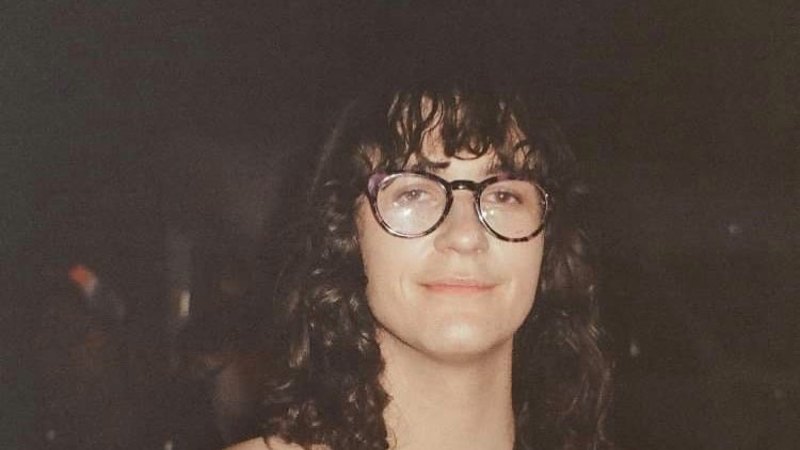Save articles for later
Add articles to your saved list and come back to them any time.
Warning: this article contains distressing content
In the three years since her sister Bridget Flack died, one thought has haunted Angela Pucci Love: what if Bridget could have been found earlier?
Flack, 28, had been missing for 11 days when her body was found by community members in bushland at Willsmere-Chandler Park, in East Kew.
Angela Pucci Love, whose sister Bridget Flack died by suicide three years ago.Credit: Wayne Taylor
The initially lacklustre police response to Flack’s disappearance – an officer told Pucci Love three days after her sister disappeared that there was nothing more they could do – is now under investigation by Coroner Ingrid Giles.
The approach of police into Flack’s disappearance is just one element of a wide-ranging inquest into the deaths of five young transgender women who took their own lives in Melbourne in 2020 and 2021: Flack, Natalie Wilson, Matt Byrne, “AS”, whose identity has been suppressed, and Heather Pierard.
Giles will also investigate the incidence of mental ill health and suicidality in trans and gender diverse communities, and the availability and provision of gender-affirming and social care to trans and gender diverse people.
Bridget Flack, pictured in 2020.Credit: Facebook
The coronial inquest into the suicide cluster, held this week, was groundbreaking: every witness and lawyer was invited to share their preferred pronouns before they addressed the court; the women’s preferred names and pronouns were used; and “dead names” (names assigned at birth) were removed from documents released to the media.
One after another, relatives of the women stood up in the Coroners Court to describe the devastating impacts of losing their daughters and sister. They described beautiful young women with their lives ahead of them. But they also described the discrimination, dislocation and isolation faced by them as members of the trans community.
Rachel Byrne said the suicide of daughter Matt in March 2021 had “ripped a hole” in her family.
“The joy is gone from each of our lives. And as Matt’s mum, I just wait for the day when we’re together again,” she said.
“It is so agonising that Matt felt that suicide was the only option. So much work is needed to support all those in the transgender community to be accepted, celebrated and acknowledged as an incredible part of our community … Our lives are richer for them. Transgender lives matter.”
Pierard’s mother Kedra told the inquest her daughter had known both Matt and AS, and their suicides had been “truly devastating for her”.
“I can only hope this inquest will bring awareness and positive change for the transgender community, more access to affordable mental health care, and more tailored understanding within medical and law agencies,” Pierard said.
“Losing Heather has left me heartbroken and filled with sadness that will never leave me. Our family will never be the same again.”
Heather Pierard, one of five young transgender women whose suicides are being investigated by the Coroners Court.
By the time Bryne, Pucci Love and Pierard had finished speaking, Giles, counsel assisting Gemma Cafarella, and several of the senior lawyers in the courtroom were in tears.
“I found it really touching that the coroner allowed herself that level of emotion,” Pucci Love said later. “It showed she cared. ”
The women involved in the suicide cluster were aged between 18 and 32 when they died in Melbourne. Three knew each other. All had histories of mental illnesses, and all felt socially isolated during the COVID-19 pandemic and lockdowns.
In a submission to the inquest, consultant psychiatrist Dr Jaco Erasmus, writing on behalf of the Monash Health gender clinic, said the COVID-19 pandemic had a “broad and significant” impact on the trans community.
“The lockdowns resulted in isolation, cancellations of surgery and closure of clinics,” Erasmus wrote.
“The only Australian study to explore the impact of COVID-19 … found that 61.1 per cent of its 1019 participants were experiencing clinically significant symptoms of depression … 49 per cent of participants reported that they had thought that they would be better off dead or [thought] of hurting themselves in the two preceding weeks. The risk of having these thoughts was increased by 54 per cent due to cancellation or postponement of gender-affirming surgery due to COVID-19.”
A separate submission from the Royal Children’s Hospital in Melbourne cited a longitudinal study conducted in 2022 which, over 12 months, tracked the wellbeing of 104 trans young people aged 13 to 20.
That study showed people who began gender affirmation hormone treatment during the year reported 60 per cent lower “odds” of depression, and 70 per cent lower odds of suicidality, compared to those who had not begun hormone treatment.
Son Vivienne, chief executive of Transgender Victoria, gave evidence at the inquest as part of an expert panel of professionals and people with transgender and gender diverse lived experience.
They hoped social and cultural changes would flow from the coronial inquest, including better systems of recognising trans people and gender diversity in police systems; better access to mental health and medical care that is safe and culturally appropriate; and core funding for peer services.
For help, visit Lifeline at lifeline.org.au, call 13 11 13 or text 0477 13 11 14.
Get the day’s breaking news, entertainment ideas and a long read to enjoy. Sign up to receive our Evening Edition newsletter.
Most Viewed in National
From our partners
Source: Read Full Article



